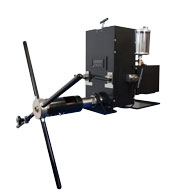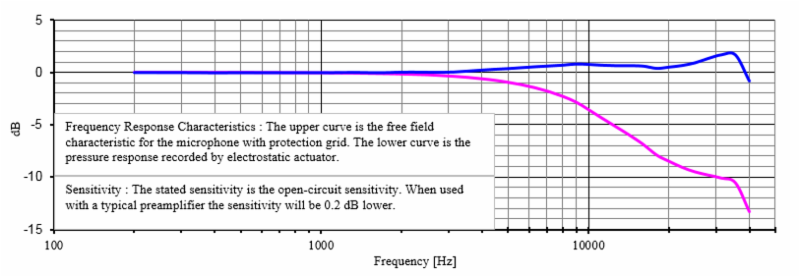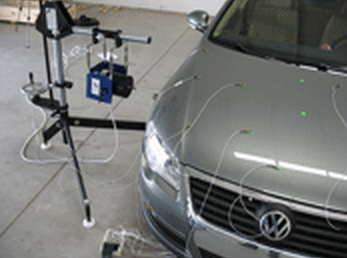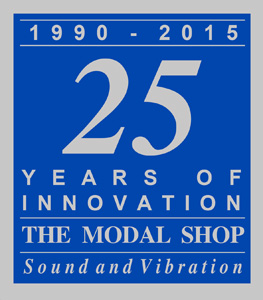| | |
Welcome to Issue #93
|
| Sponza Palace,
Dubrovnik, Croatia
Photo Credit: Joanbanjo, Wikipedia.com |
Dobar dan! (Hello or literally "Good Day" in Croatian). This month's editorial is being authored from the ancient city of Dubrovnik, Croatia. Touring the walled city on a summer holiday, I came across the Sponza Palace. The palace's atrium served as a trading center and business meeting place. An inscription on an arch testifies to both its public function and the character of business workings:Fallere nostra vetant et falli pondera. Meque pondero cum merces ponderat ipse deus. "Our weights do not permit cheating. When I measure goods, God measures with me."I thought I would share this as another historical and beautiful testament to the importance of metrology in science, business and commerce! Please enjoy this month's edition and enjoy and recharge on your summer holidays wherever they may be.
|
|
|
Tip of the Month:
When Calibrating Microphones, Be Sure Electrostatic Actuator is Fully Seated
|
When calibrating precision condenser microphones for frequency response, be sure the electrostatic actuator is fully seated and parallel with the diaphragm of the microphone or else acoustic reflections will display in the frequency response.
|
|
Technical Exchanges
|
By The Modal Shop, Inc.
July 19, 2015, 1 pm - 5 pm
Grapevine, TX
July 20-23, 2015
Grapevine, TX
By The Modal Shop, Inc.
July 24, 2015
Dallas, TX
August 3-6, 2015
Austin, TX
August 9-12, 2015
San Francisco, CA
By The Modal Shop, Inc.
August 13, 2015
Phoenix, AZ
August 30-September 4, 2015
Prague, Czech Republic
October 20-22, 2015
Novi, MI
|
|
Quick Links
|
ISO TC 108 - Mechanical vibration, shock and condition monitoring
ISO TC 108/SC 3 - Use and calibration of vibration and shock measuring instruments
|
|
Previous Newsletters
|
Calibration from the Risk Management Perspective; Microphone Calibration Part I
Why is 100 Hz or 159.2 Hz the Reference Frequency?; Sound Power Basics
|
|
Select Newsletter Articles
by Topic
| |
|
|
|
Small Arms Ammunition Manufacturer's Institute
(SAAMI) Discusses High Pressure Sensors
and Calibration
By Mike Dillon, Calibration Product Manager
|
 Early this quarter, PCB Piezotronics, Inc. again played host to the annual Small Arms Ammunition Manufacturer's Institute (SAAMI). SAAMI is an association of the nation's leading manufacturers of firearms, ammunition and components. Members voluntarily participate in this group to promote and ensure product safety, interchangeability, reliability and quality. The organization holds an annual meeting in Buffalo, NY to afford attendees the opportunity to get pressure sensor training directly from PCB. Early this quarter, PCB Piezotronics, Inc. again played host to the annual Small Arms Ammunition Manufacturer's Institute (SAAMI). SAAMI is an association of the nation's leading manufacturers of firearms, ammunition and components. Members voluntarily participate in this group to promote and ensure product safety, interchangeability, reliability and quality. The organization holds an annual meeting in Buffalo, NY to afford attendees the opportunity to get pressure sensor training directly from PCB.
Mr. Bob Metz, director of PCB's Aerospace and Defense Division, provided training on pressure sensor design, construction and hands-on...
Click to read full article
modalshop.com/calibration.asp?ID=1063
|
Microphone Calibration Part II:
Electrostatic Actuator Frequency Response
By Bryan Butsch, Engineer
|

In last month's article, we learned how to measure the open circuit sensitivity of a precision condenser microphone using the insert voltage technique. This month, we will talk about how to measure the frequency response curve of a precision condenser microphone using the electrostatic actuator method as outlined in the International Electrotechnical Commission (IEC) section 61094-6.
Before delving into the "whats" and "hows" of electrostatic actuator calibration, let us first talk about why the electrostatic actuator method is the preferred method of measuring the frequency response of precision condenser microphones. There are three types of ideal sound fields: the pressure field, the free field and the...
modalshop.com/calibration.asp?ID=1061
|
Blast from the Past:
Sensor Considerations in Automotive
Modal Analysis
|
 Classical and operating modal analyses are important tools for understanding and optimizing dynamic automotive structural behaviors, leading to stronger and safer automobiles; lighter construction yield; improved fuel consumption and performance, ride quality, handling and NVH. From the measured vibration data and modal analysis, engineers are able to construct dynamic models of vehicles and substructures. The dynamic models predict resonant frequencies, damping values and...
modalshop.com/calibration.asp?ID=226
|
| |
Thanks for joining us for another issue of "Dynamic Sensors & Calibration Tips." As always, please speak up and let us know what you like. We appreciate all feedback: positive, critical or otherwise. Take care!
Sincerely,
 Michael J. Lally A PCB Group Company |
|